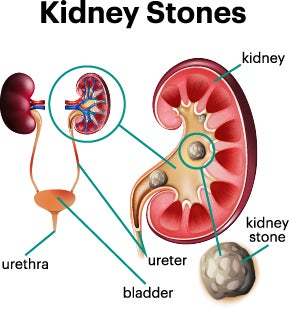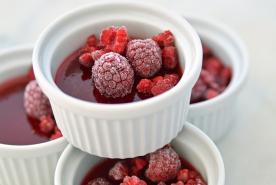Last updated: August 26, 2025
Medically reviewed by: NKF Patient Education Team
Kidney stones can occur in infants, children and teenagers. They are more common as children get older but can form in babies.
Table of Contents
Content Created by: Melanie Betz MS, RD, CSR, FNKF, FAND
About Kidney Stones
Your kidneys clean your blood and remove waste through your urine. Urine has different chemicals in it. If there is too much of some chemicals and not enough water, they can stick together and form kidney stones. The most common chemicals that cause stones are calcium, oxalate, uric acid, cystine, and phosphate.
After a kidney stone is formed, it can stay in the kidney and not cause issues. Sometimes, kidney stones go down the urinary tract into the ureter. Tiny stones can move out of the body without causing too much pain. However, most of the time kidney stones cause pain from moving down the ureter (YUR-uh-ter) A ureter is a thin tube that carries urine from each kidney to the bladder. as your body works to get rid of them in your urine. Occasionally, kidney stones that don’t move can cause a back-up of urine in the kidney, which can be painful and cause kidney damage.

Kidney Stones in Children and Teens
Unfortunately, many more children and teens are getting kidney stones. Since 1990, about 3 times more children and teens are getting kidney stones. Specifically, people who are between the ages of 12-17 years old are getting more kidney stones. Kidney stones aren’t increasing as much in younger children as they are in older children.
Causes of Kidney Stones in Children and Teens
The exact reason why more children are getting more kidney stones is unclear but is probably related to a combination of things such as genetics, diet and lifestyle.
Diet & Lifestyle
Like adults, an unhealthy diet can cause kidney stones in children. Children in the United States are eating more salt and sugar than they need. Most also do not eat enough fruits and vegetables. All of these things can increase the risk of kidney stones.
Too much sweating and not drinking enough fluid can also increase kidney stones in children.
Genetics
Genetics, or having a family history of kidney stones, can also cause kidney stones in children and teens.
Some rare genetic conditions can cause kidney stones in children. These include:
- Primary hyperoxaluria – a condition where the body makes too much of a substance called oxalate, which can form stones.
- Cystinuria – a condition that causes too much of a protein called cystine to build up in the urine (pee), leading to stones.
- Medullary sponge kidney (MSK) – a condition where tiny cysts form in the kidneys, which can lead to kidney stones.
Your genes can also slightly change the way your kidneys make urine, which can make kidney stones more likely. For example, your genes can cause higher levels of urine calcium, oxalate, or lower levels of citrate in your urine. All of these things make calcium kidney stones more likely.
Health Conditions & Medications
Some health conditions and situations can raise the risk of kidney stones in children, including:
- Inherited conditions – such as primary hyperoxaluria and cystinuria, which cause certain substances to build up in the urine and form stones.
- Blocked urine flow – when urine can't leave the body easily, it can lead to stone formation.
- Kidney infections – repeated or long-lasting infections can increase the chance of stones.
- Bowel diseases – such as Crohn's disease or ulcerative colitis, which can affect how the body absorbs nutrients and fluids.
- Weight-loss surgery – certain types of surgery can change how the body processes minerals, leading to stones.
- Eating disorders – not eating enough or losing weight too quickly can affect the balance of substances in the body and increase stone risk.
Some medicines can raise the risk of kidney stones, especially if taken for a long time or in high doses. These include:
- Topiramate – a medicine used to treat seizures or migraines.
- Furosemide – a water pill (diuretic) that helps the body get rid of extra fluid.
- Some antibiotics – certain types can affect the balance of substances in the urine.
- Famotidine – a medicine used for heartburn or acid reflux.
- Too much calcium or vitamin D supplements – can cause extra calcium in the urine.
- Overuse of laxatives – taking too many can lead to dehydration and affect kidney health.
Types of kidney stones in children
Similar to adults, the most common types of kidney stones in children and teens are calcium oxalate and calcium phosphate.[1]
Calcium kidney stones can be made of calcium oxalate or calcium phosphate.
- Calcium oxalate kidney stones are the most common type. They are usually caused by a combination of diet, genetic and medical factors. Eating too much sodium, added sugar and protein from meat, poultry and fish can cause calcium kidney stones. Not getting enough calcium can contribute to calcium oxalate kidney stones.
- Calcium phosphate stones are less common than other types. They can form when your urine is too alkaline (say: AL-kuh-line), which means your urine is not very acidic—more like plain water. Certain health problems or medicines can make this happen and raise your risk of getting these stones.
Signs & symptoms of kidney stones
The signs of kidney stones in children and teens are similar to adults. Some of the most common symptoms are:
- Sudden, severe pain in back or side
- Nausea or upset stomach and vomiting
- Groin pain as the stone passes down the urinary tract
- Severe stomach pain only (young children especially)
- Burning or pain while peeing
- Blood in pee (hematuria)
- Fever or urinary tract infection
How to treat kidney stones in children
Kidney stones in kids can cause severe pain. It is important to work with your child’s doctor to manage pain from kidney stones and be sure your child can pass a kidney stone safely. Your doctor might recommend increased fluids to help pass a stone, and medication to help manage pain. Sometimes, surgery such as ureteroscopy or percutaneous nephrolithotomy is needed to get rid of the kidney stone.
The best treatment for kidney stones depends on how big the stone is, where it is and what kind of kidney stone it is.
How to help prevent kidney stones in children
Preventing kidney stones is different for every child depending on the type of kidney stone they make, urine chemistry, other medical history and lifestyle factors. It is important to work with your child’s doctor to come up with a personalized kidney stone prevention plan.
It is important to get a 24-hour urine collection to understand why your child is making kidney stones. Based on those results, your doctor might suggest medication or lifestyle changes.
Some of the most common nutrition and lifestyle changes recommended for children with kidney stones are:
- Drink a lot of fluid throughout the day). Ask your healthcare team how much fluid is right for your child.
- Avoid too much salt from eating lots of foods like processed meats (hot dogs, sausage, deli meat), fast foods, chips, salad dressing, soup and frozen/canned prepared foods
- Eat plenty of fruits and vegetables
- Avoid too much added sugar from foods like soda, cake, cookies, candy and ice cream
- Get in enough calcium from foods like milk, yogurt and lower sodium cheeses such as mozzarella, Swiss or goat cheese
- Avoid vitamin C supplements
You can work with a registered dietitian nutritionist (RDN) to help you learn which diet changes will prevent kidney stones for your child and help you make those changes.
Questions to ask your doctor
- Why do you think my child is forming kidney stones?
- Can we get a 24-hour urine test to better understand what is causing my stones?
- Should I see both a urologist and nephrologist as part of my kidney stone care team?
- What can we do to prevent more kidney stones?
- Are there genetic testing for kidney stones”
















